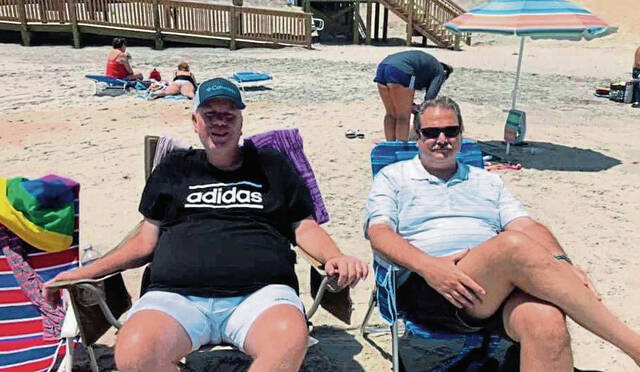https://triblive.com/local/valley-news-dispatch/dying-brother-in-law-donates-kidney-to-former-lower-burrell-mayor-rich-callender/
Dying brother-in-law donates kidney to former Lower Burrell Mayor Rich Callender

Ken Hulst wanted to give one of his kidneys to his brother-in-law, former Lower Burrell Mayor Rich Callender, who needed a kidney for long-term survival.
Hulst, a former Lower Burrell resident, died of complications from amyotrophic lateral sclerosis — ALS — on Aug. 28. Within 24 hours, Callender received one of Hulst’s kidneys.
“We’re just glad to help Rich,” said Hulst’s widow, Jennifer Hulst, 45, of Topsail, N.C. “Ken wasn’t able to save his own life, but he was able to save Rich’s life so he will be there for his family longer.”
The men’s medical fates forever are intertwined.
They were close friends and in-laws. Jennifer Hulst’s sister, Lisa, is married to Callender. Besides family functions, Hulst and Callender attended baseball games together, as well as their children’s sporting events.
“He was the brother I never had,” said Callender, who has five sisters.
When Callender received a double lung transplant in 2015, the Hulsts returned home to Lower Burrell to help Callender and his family with recovery. Callender technically died twice during the double lung transplant surgery.
Complications from the transplant and drugs impacted his kidney function. Callender is active but has needed dialysis to survive. He has been on the kidney transplant list for three and half years.
“We knew about Rich’s health issues,” Jennifer Hulst said. She and Ken Hulst were married for 21 years and had two daughters.
Two days after the Hulst family moved to Topsail from Lower Burrell in 2015, they rushed back home to Lower Burrell to be with Callender’s family for Rich’s double lung transplant.
“As time went on, we knew Rich needed a kidney transplant,” Hulst said. “The whole family has been waiting and hoping he would get one someday.”
In the meantime, Ken Hulst was diagnosed with ALS, a fatal and degenerative disease, in 2020.
Callender and his family occasionally would visit the Hulsts in North Carolina to help with care-giving for Ken Hulst. The Callenders bought a retirement home in June to be closer to the family.
The two men candidly discussed their respective health situations since he was diagnosed.
“Ken knew the circumstances and what his end result would be. He knew what I had been through, and it was easy for him to talk to me about his health,” Callender said.
“Ken did not want to live in a vegetative state,” he said. “Ken told me that if he died tomorrow, it would be a better life for him.”
Hulst also told Callender he wanted to give him his kidney, but their blood types didn’t match. Hulst believed he was B-positive while Callender is O-positive. Callender put the possibility out of his mind.
Then in mid-August, a complication from ALS led to a brain injury, and Hulst lost consciousness and was taken to the ICU of a North Carolina hospital. The Callenders headed south to be with the family.
Hulst remained unresponsive for about 10 days until his death. While Callender was there with family, he brought up the possibility of donating Ken’s organs so there was some purpose in his tragic death.
Hulst had been hoping for a miracle for her husband when he was on life-support a couple of weeks ago. “I hoped he would wake up and give a glimmer of hope,” she said. “When I realized that hope was gone, I wasn’t ready to give up,” Hulst said.
Thinking about her family, including Rich Callender, in the 11th hour, Jennifer Hulst requested bloodwork on her husband to see if he could be an organ donor.
When she found out her husband’s recollection of his blood type was wrong and he was a match for Callender, other tests were conducted to see if the transplant could take place.
“We knew one day that the time would come when we would say goodbye to my husband,” Hulst said. “What helped us get through the loss was knowing something good came with it. Ken saved two lives.”
His other kidney went to an unidentified woman.
“We’re just so proud of him,” Hulst said of her late husband. “He’s no longer with us, but he’s a hero to us.”
Callender found out about his brother-in-law’s positive match for a kidney donation on his 54th birthday on Aug. 27.
“I was floored,” Callender said. Instead of elation, Callender was consumed with the logistics of moving quickly from North Carolina to UPMC in Pittsburgh to make sure he could accept the transplant and prepare.
A medical team assembled in North Carolina to harvest Hulst’s two kidneys.
The kidney for Callender was transported via car to UPMC.
Within 24 hours of Hulst’s death, his kidney was transplanted into Callender during a three-hour surgery. Callender was released from the hospital on Thursday and is home recovering.
“I went from mourning the loss of my brother-in-law to knowing that he would always be there with me by his generous donation,” he said. “The biggest thing is that you shouldn’t think that your organs aren’t compatible or aren’t any good and that you can’t save a life because miracles do happen.”
Copyright ©2026— Trib Total Media, LLC (TribLIVE.com)
